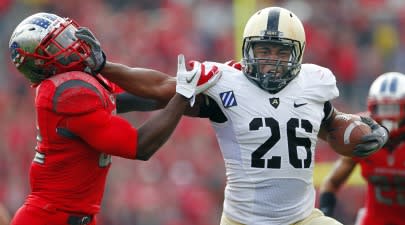Army Football: A Proposal to the USMA Superintendent, Part 1 of 6

A wise old man, Albert Einstein, once said that the definition of insanity is doing the same things over and over again and expecting different results.
The following is Part 1 of our 6 parts that propose some approaches that could be taken to improve the competitiveness of Army Football. Each can be implemented independently or together with all or some of the other approaches. Almost everything that can be done is within the decision making power of the USMA Superintendent.
Advertisement
This addresses the need to make a commitment to field a football team that is competitive and wins the majority of its games against major college (FCS) competition.
Background
Douglas MacArthur became USMA Superintendent in 1919, under the direction of Chief of Staff Peyton March, to lead reforms at the academy. He got Congress to restore the course length back to four years, and he instituted a number of reforms that led to fielding competitive sports teams. Army teams, especially football, became one of the dominant teams over the succeeding decades.
Red Blaik, though a USMA graduate, became the first civilian head football coach at USMA in 1941, after Army suffered two consecutive losing seasons. He demonstrated the capability of USMA to field highly competitive teams during three separate periods - World War II, after the war, and in the late 1950s. Throughout his service, Blaik was criticized by some that he was turning USMA into a football factory.
Back in the early 1950s, eight eastern universities, long academically and athletically competitive with Army, decided to take certain steps to limit the influence of football, such as eliminating spring football practice and not offer athletic scholarships. They eventually formed the Ivy League. There were some at USMA that thought Army ought to follow this lead, but others decided to continue competing against the best of the best.
The late 1960s to early 1980s were not kind to Army Football, thanks to the Vietnam War and the emergence of pro football. While future schedules were made against the best teams more than ten years in advance, USMA found it no longer could recruit talent who wanted to pursue a pro dream rather than a military commitment. Head coaches Paul Dietzel and Tom Cahill fielded strong winning teams, but were unable to celebrate their success with post-season bowl games. Eventually, Army suffered through four head coaching changes from 1969 to 1982, 11 of 14 losing seasons and a loss of national competitiveness and significance.
The hiring of Jim Young in 1983 and his switch to the wishbone option offense a season later began to restore the competitiveness to Army Football. This led to four bowl games with two upset wins and two near-wins. In 1996, it was clear that USMA Superintendent Daniel Christman was supportive of Army Football's return to competitiveness, and decided to join Conference USA to further those aims. The conference experience from 1998 through 2004 was a disaster, as was the change in head coaches and offensive schemes twice.
Throughout these years, USMA leadership has generally been supportive of Army Football, and desires it to be competitive, but sends mixed messages. USMA leadership is not a monolithic group, and there are some who desire to de-emphasize football in favor of academic pursuits; some who would rather have Army compete in the Ivy or Patriot Leagues in the FCS/I-AA ranks; and many are not willing to do some of the same things that are done in other major colleges.
Meanwhile, some are quite committed to Army football and contribute to allow for the building of modern athletic facilities, high-quality coaching staffs and best possible recruits. Army was only second to Notre Dame to have a national television contract with ESPN to show all home football games and successfully transferred that to CBS.
But winning only two or three games a year, scheduling and losing to lesser talented conferences and teams; lowered attendance at Michie Stadium; and conference realignment are just some of the challenges. There is a hunger by some to schedule more traditional and ranked opponents or join a major conference. Confusion reigns.
Proposal
There is a difference in supporting something, and being committed to it.
No senior military leadership would field a fighting force today without the right equipment, manpower and weapon systems. Lessons learned from Vietnam told us not to fight with one hand behind our back, and without the support of the American people.
There are politicians and government officials of both parties who would rather not have a world-class military, would cut capabilities and resources to save money or in terms of efficiencies or avoid world problems in favor of domestic issues. There are certainly opportunities to make things efficient and effectiveness, and avoid waste.
Thank goodness the majority of Americans, and their elected representatives, are supportive and committed to a world-class military.
Now, USMA leadership (and the Department of the Army), needs to decide whether or not they are willing to commit to fielding an Army Football team that is competitive and can win against major college competition.
Or not.
Stay Tuned For Part II
** To chat with other Army fans about this article and more, please visit The 12th Knight message board.**